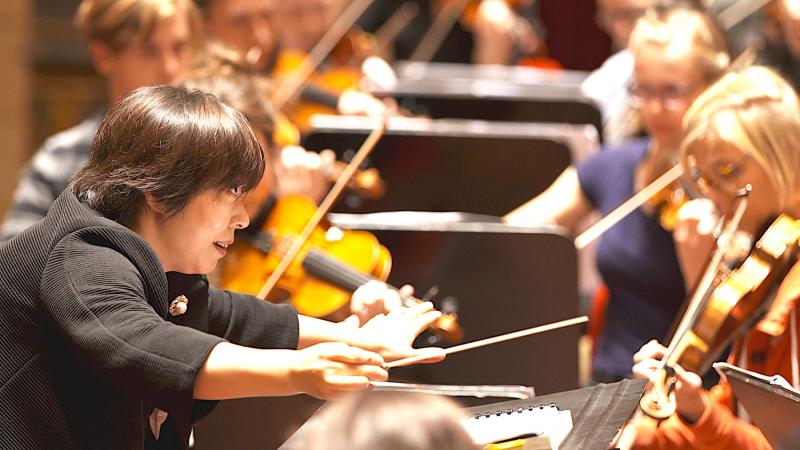Beyond the Grace Note, Sky Arts review - march of the women conductors | reviews, news & interviews
Beyond the Grace Note, Sky Arts review - march of the women conductors
Beyond the Grace Note, Sky Arts review - march of the women conductors
A message of long-belated triumph, but there's real exasperation too

Perhaps the most surprising thing is how good natured they all sound. There’s no anger. At least, not much – one can’t help wondering what they say off air.
Women are increasingly stepping to the fore in the world of orchestral conducting, but my goodness, it has taken a long time. In a world in which one concert hall director can still suggest it does not need a woman on the podium because there was already one once 100 years ago, the problem is clear. International Women's Day is the perfect time to make it clearer still.
In this film for Sky Arts, director Henrietta Foster has assembled interviewees from Marin Alsop, the one woman conductor who is possibly a household name, to Lithuanian shooting star Mirga Gražinytė-Tyla (pictured below), Xian Zhang from China, Joana Carneiro from Portugal, the American Rebecca Miller and several familiar British musicians including Jane Glover, Sian Edwards, Andrea Brown and Alice Farnham.
 Sensibly, there's no extraneous narration; their accounts are eloquent enough on their own. They recall their beginnings, with varying parental attitudes: Gražinytė-Tyla jokes that her parents tried to save her from such a career, while Carneiro received her first baton from her encouraging family, aged nine. Most challenges facing women conductors are naturally the same as those facing men: the need for experience leads them to form and run their own orchestras, and there's always the importance of an authentic musical message, clearly conveyed. But sometimes the smallest of gestures betrays the elephant in the room. Zhang recalls that her professor was keen to encourage girls in her conducting class. “Fantastic teacher,” she says - with the smallest of hesitations and a tiny bite of the lip.
Sensibly, there's no extraneous narration; their accounts are eloquent enough on their own. They recall their beginnings, with varying parental attitudes: Gražinytė-Tyla jokes that her parents tried to save her from such a career, while Carneiro received her first baton from her encouraging family, aged nine. Most challenges facing women conductors are naturally the same as those facing men: the need for experience leads them to form and run their own orchestras, and there's always the importance of an authentic musical message, clearly conveyed. But sometimes the smallest of gestures betrays the elephant in the room. Zhang recalls that her professor was keen to encourage girls in her conducting class. “Fantastic teacher,” she says - with the smallest of hesitations and a tiny bite of the lip.
Nobody actually hammers us over the head about the sexism of the music world. Instead the film quietly draws us into these musicians’ worlds and we admire their professionalism and forthright attitude, so that when the ugliness of prejudice rears up, it is all the more shocking. Even their musical repertoire seems circumscribed by gender assumptions. Points are made about the ideas that “girls can’t conduct”, that women giving instructions are thought “shrieky”, and the difficulty of choosing comfortable, suitable concert clothes that don’t accentuate certain aspects of the, er, back view. If not a tuxedo, then what? Laura Ashley?
“I hate the gender issue,” says Glover, “because it’s not what’s important.” And it isn’t. If only we had reached a point when documentaries like this were not necessary. Yet they are, even in 2020. These are excellent conductors at the top of their game: we observe them rehearsing orchestras and choirs, teaching music students the rudiments, or performing in the world’s great concert halls. Against this background, the fact that sexist prejudice does still get in their way seems preposterous. That is the whole beauty of this film. It carries a positive message of endurance and triumph, but also a hidden grenade, ready to blow up in the face of a still complacent industry.
The future of Arts Journalism
You can stop theartsdesk.com closing!
We urgently need financing to survive. Our fundraising drive has thus far raised £49,000 but we need to reach £100,000 or we will be forced to close. Please contribute here: https://gofund.me/c3f6033d
And if you can forward this information to anyone who might assist, we’d be grateful.

Subscribe to theartsdesk.com
Thank you for continuing to read our work on theartsdesk.com. For unlimited access to every article in its entirety, including our archive of more than 15,000 pieces, we're asking for £5 per month or £40 per year. We feel it's a very good deal, and hope you do too.
To take a subscription now simply click here.
And if you're looking for that extra gift for a friend or family member, why not treat them to a theartsdesk.com gift subscription?

Add comment